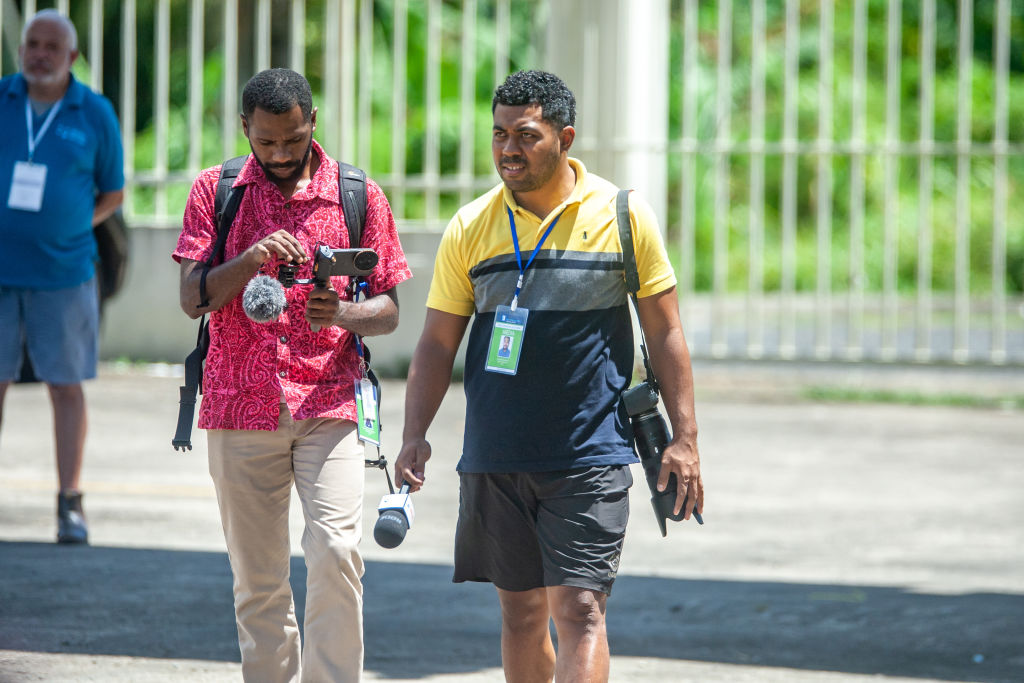
Media freedom is an essential pillar of democracy. In Pacific island countries, this pillar is under threat from financial and capacity constraints. Democratic partners—which believe in the importance of a strong, independent media—must do more to support journalism and media in the Pacific to protect the integrity of independent thought and defend against information warfare.
ASPI’s Pacific program has facilitated workshops with Pacific journalists and engaged with media professionals to help identify the strengths, weaknesses and opportunities for development in their organisations. This work points to some key lessons that should guide governments and other groups seeking to further support Pacific media.
The spread of information online—which includes some information that is false, deliberately manipulative and harmful—moves much more rapidly than media outlets and governments can keep up with. Researchers from the Massachusetts Institute of Technology, for example, found that fake news spreads six times faster than real news on Twitter. False information disguised as government leaks is increasingly being shared online, compelling leaders to release correct information faster.
More and more of what should be government announcements are coming from the private social media accounts of individual politicians. That puts journalists on the back foot when addressing current events and creates unnecessary friction between governments and the media.
Some friction is important, but it should come from holding governments accountable, not a race to be the first to share information. Papua New Guinea Prime Minister James Marape’s admonishment of the media for reporting on a potential US presidential visit is a recent example of the unnecessary competition to be first with journalists who are just doing their jobs.
In some cases, journalists have inadvertently reported false leaks and rumours as fact based on what they were been exposed to online. These inaccuracies often come from inexperience in detecting false information, and insufficient time to closely check sources plagues young journalists, exacerbating mistrust. Senior media professionals lack the resources to provide the mentoring required for these roles and would welcome additional outside support.
Support does exist, but democratic partners still need to do more to provide Pacific media outlets with training and exchange opportunities. Unlike some other areas of engagement in the Pacific, we are not at risk of overwhelming our Pacific counterparts in the media arena. In fact, nearly every individual we spoke with was hungry for more training and greater engagement.
In Solomon Islands, BBC Media Action’s first foray into the Pacific has addressed some of the underlying challenges in reporting, including emergency broadcasting and financial broadcasting. By embedding a trainer in the country and reaching beyond the capital, this training program has been exemplary in meeting Solomon Islands’ needs and is greatly appreciated by local media institutions.
BBC Media Action is not alone in this endeavour. The Australian Broadcasting Corporation’s international development group also delivers huge benefits across many Pacific countries and is growing again. But partners should establish more of these programs across the region. In cases where a trainer can’t be based in the country, consistency and strong relationships are key.
Many senior reporters and executives also lament the loss of exchange opportunities. They speak highly of past programs that allowed them to travel and learn for a short period of time in much larger and more complex newsrooms.
Offering these exchange opportunities again would be extremely beneficial for Pacific media, but they must be two-way. We shouldn’t burden small Pacific news outlets with a temporary loss of personnel, and two-way exchanges would also give partners’ media staff invaluable experience in the region.
Beyond training, Pacific media professionals will struggle to implement best practices without appropriate funding. Pacific media organisations are not adequately resourced to keep up with demand and need more equipment. In the near term, that means the provision of laptops, cameras and quality sound-recording equipment, and the training required for their use and maintenance.
Building a strong, independent and resilient Pacific media is crucial to countering misinformation and disinformation operations in the region. Rumours of corruption, assassination plots and financial opportunities swirl online and in person. The confusion this creates provides opportunities for malign actors to manipulate information and populations.
Pacific journalists frequently mentioned geopolitics as an area of growing concern for false information. ASPI has previously highlighted some of the influence activities being undertaken in Pacific island countries by the Chinese Communist Party, including suppressing the truth and spreading lies in Solomon Islands, accusing Australia and the US of instigating the November 2021 Honiara riots, and seeking to undermine democracy and partnerships across the region.
To increase Pacific resilience to these information operations, democratic partners need to be more transparent and support Pacific media to critically evaluate whether proposed assistance and equipment truly benefit the people.
Moving beyond simply copying and pasting press releases requires effort on both sides. Partners shouldn’t deliver equipment, aid or infrastructure without providing an opportunity for the press to ask questions and encouraging local journalists to take those opportunities whenever they can. From these questions stems a story about how this support is truly benefiting people in the Pacific.
Transparency is one of the many strengths that sets democratic partners apart from authoritarian alternatives. For instance, the Media Association of Solomon Islands boycotted Chinese Foreign Minister Wang Yi’s speech in Honiara in May 2022 when they were told that only one Solomon Islands journalist could ask their own minister a question at the event.
No media in any country should have to rely on support from China, a country that consistently ranks among the world’s worst for media freedom—particularly if that partner is also responsible for spreading false information and seeking to manipulate the information environment.
Unfortunately, many Pacific island countries are heavily reliant on Beijing’s support, and without greater effort from democratic partners, Pacific media organisations won’t be equipped to survive the constant barrage of false information and confusion they face.

